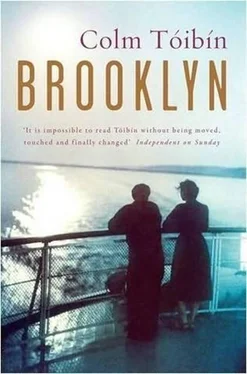"Did something happen?" Eilis asked once they were on the street.
"Say nothing until we are a mile away from that house," Nancy said. "Mammy knows there's something, but I'm not telling her."
They walked down Friary Hill and across the Mill Park Road to the river and then down along the prom towards the Ring-wood.
"She got off with George Sheridan," Annette said.
"When?" Eilis asked.
"At the dance in the Athenaeum on Sunday night," Nancy said.
"I thought you weren't going to go."
"I wasn't and then I did."
"She danced all night with him," Annette said.
"I didn't, just the last four dances, and then he walked me home. But everybody saw. I'm surprised you haven't heard."
"And are you going to see him again?" Eilis asked.
"I don't know." Nancy sighed. "Maybe I'll just see him on the street. He drove by me yesterday and beeped the horn. If there had been anyone else there, I mean anyone of his sort, he would have danced with her, but there wasn't. He was with Jim Farrell, who just stood there looking at us."
"If his mother finds out, I don't know what she'll say," Annette said. "She's awful. I hate going into that shop when Jim isn't there. My mother sent me down once to get two rashers and that old one told me she didn't sell rashers in twos."
Eilis then told them that she had been offered a job serving in Miss Kelly's every Sunday.
"I hope you told her what to do with it," Nancy said.
"I told her I'd take it. It won't do any harm. It means I might be able to go to the Athenaeum with you using my own money and prevent you being taken advantage of."
"It wasn't like that," Nancy said. "He was nice."
"Are you going to see him again?" Eilis repeated.
"Will you come with me on Sunday night?" Nancy asked Eilis. "He mightn't even be there, but Annette can't come, and I'm going to need support in case he is there and doesn't even ask me to dance or doesn't even look at me."
"I might be too tired from working for Miss Kelly."
"But you'll come?"
"I haven't been there for ages," Eilis said. "I hate all those country fellows, and the town fellows are worse. Half drunk and just looking to get you up the Tan Yard Lane."
"George isn't like that," Nancy said.
"He's too stuck up to go near the Tan Yard Lane," Annette said.
"Maybe we'll ask him if he'd consider selling rashers in twos in future," Eilis said.
"Say nothing to him," Nancy said. "Are you really going to work for Miss Kelly? There's a one for rashers."
Over the next two days Miss Kelly took Eilis through every item in the shop. When Eilis asked for a piece of paper so she could note the different brands of tea and the various sizes of the packets, Miss Kelly told her that it would only waste time if she wrote things down; it was best instead to learn them off by heart. Cigarettes, butter, tea, bread, bottles of milk, packets of biscuits, cooked ham and corned beef were by far the most popular items sold on Sundays, she said, and after these came tins of sardines and salmon, tins of mandarin oranges and pears and fruit salad, jars of chicken and ham paste and sandwich spread and salad cream. She showed Eilis a sample of each object before telling her the price. When she thought that Eilis had learned these prices, she went on to other items, such as cartons of fresh cream, bottles of lemonade, tomatoes, heads of lettuce, fresh fruit and blocks of ice cream.
"Now there are people who come in here on a Sunday, if you don't mind, looking for things they should get during the week. What can you do?" Miss Kelly pursed her lips disapprovingly as she listed soap, shampoo, toilet paper and toothpaste and called out the different prices.
Some people, she added, also bought bags of sugar on a Sunday, or salt and even pepper, but not many. And there were even those who would look for golden syrup or baking soda or flour, but most of these items were sold on a Saturday.
There were always children, Miss Kelly said, looking for bars of chocolate or toffee or bags of sherbet or jelly babies, and men looking for loose cigarettes and matches, but Mary would deal with those since she was no good at large orders or remembering prices, and was often, Miss Kelly went on, more of a hindrance than a help when there was a big crowd in the shop.
"I can't stop her gawking at people for no reason. Even some of the regular customers."
The shop, Eilis saw, was well stocked, with many different brands of tea, some of them very expensive, and all of them at higher prices than Hayes's grocery in Friary Street or the L &N in Rafter Street or Sheridan's in the Market Square.
"You'll have to learn how to pack sugar and wrap a loaf of bread," Miss Kelly said. "Now, that's one of the things that Mary is good at, God help her."
As each customer came into the shop on the days when she was being trained, Eilis noticed that Miss Kelly had a different tone. Sometimes she said nothing at all, merely clenched her jaw and stood behind the counter in a pose that suggested deep disapproval of the customer's presence in her shop and an impatience for that customer to go. For others she smiled drily and studied them with grim forbearance, taking the money as though offering an immense favour. And then there were customers whom she greeted warmly and by name; many of these had accounts with her and thus no cash changed hands, but amounts were noted in a ledger, with inquiries about health and comments on the weather and remarks on the quality of the ham or the rashers or the variety of the bread on display from the batch loaves to the duck loaves to the currant bread.
"And I'm trying to teach this young lady," she said to a customer whom she seemed to value above all the rest, a woman with a fresh perm in her hair whom Eilis had never seen before. "I'm trying to teach her and I hope that she's more than willing, because Mary, God bless her, is willing, but sure that's no use, it's less than no use. I'm hoping that she's quick and sharp and dependable, but nowadays you can't get that for love or money."
Eilis looked at Mary, who was standing uneasily near the cash register listening carefully.
"But the Lord makes all types," Miss Kelly said.
"Oh, you're right there, Miss Kelly," the woman with the perm said as she filled her string bag with groceries. "And there's no use in complaining, is there? Sure, don't we need people to sweep the streets?"
On Saturday, with money borrowed from her mother, Eilis bought a dark green shop coat in Dan Bolger's. That night she asked her mother for the alarm clock. She would have to be up by six o'clock in the morning.
Since Jack, the nearest to her in age, had followed his two older brothers Pat and Martin to Birmingham to find work, Eilis had moved into the boys' room, leaving Rose her own bedroom, which their mother carefully tidied and cleaned each morning. As their mother's pension was small, they depended on Rose, who worked in the office of Davis's Mills; her wages paid for most of their needs. Anything extra came sporadically from the boys in England. Twice a year Rose went to Dublin for the sales, coming back each January with a new coat and costume and each August with a new dress and new cardigans and skirts and blouses, which were often chosen because Rose did not think they would go out of fashion, and then put away until the following year. Most of Rose's friends now were married women, often older women whose children had grown up, or wives of men who worked in the banks, who had time to play golf on summer evenings or in mixed foursomes at the weekends.
Rose, at thirty, Eilis thought, was more glamorous every year, and, while she had had several boyfriends, she remained single; she often remarked that she had a much better life than many of her former schoolmates who were to be seen pushing prams through the streets. Eilis was proud of her sister, of how much care she took with her appearance and how much care she put into whom she mixed with in the town and the golf club. She knew that Rose had tried to find her work in an office, and Rose was paying for her books now that she was studying bookkeeping and rudimentary accountancy, but she knew also that there was, at least for the moment, no work for anyone in Enniscorthy, no matter what their qualifications.
Читать дальше












